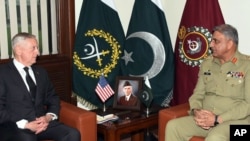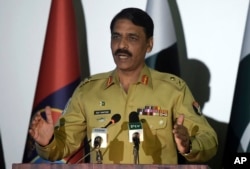A top American general has told Pakistan's army chief the U.S. military does not intend to conduct any unilateral strikes inside the country and both sides emphasized the need for continued cooperation to fight terrorism, an official announcement said Friday.
U.S. Central Command General Joseph Votel telephoned General Qamar Javed Bajwa this week and offered the assurance, said army spokesman Major-General Asif Ghafoor, while releasing details of the conversation. He did not say when it occurred.
The high-level contact came after U.S. President Donald Trump, in a New Year Day's tweet, accused Pakistan of "lies and deceit," saying the country is providing havens to militants fighting U.S. forces in Afghanistan.
The Trump administration subsequently suspended nearly $2 billion in security assistance to Islamabad until it takes "decisive action" against alleged Afghan militant sanctuaries on Pakistani soil.
Ghafoor said Votel reiterated Washington's concerns, saying they are undermining Pakistan's counterterrorism contributions.
"The U.S. is not contemplating any unilateral action inside Pakistan, but is seeking cooperation to tackle Afghan nationals, who, in the U.S.'s view, use Pakistan's soil against Afghanistan," the spokesman quoted Votel as telling Bajwa.
Ghafoor said the army chief told the U.S. general the entire Pakistani nation "felt betrayed over U.S. recent statements despite decades of cooperation."
The spokesman said that during the conversation with Votel, General Bajwa noted Pakistan was fully aware of U.S. concerns about the activities of Afghan nationals in Pakistan and that steps were being taken to counter them.
"[The army chief] reiterated that Pakistan will not seek resumption of [U.S.] aid but expects honorable recognition of our contributions, sacrifices and unwavering resolve in the fight against terrorism for peace and stability in the region."
A Central Command spokesman confirmed Votel's contact with Bajwa.
"U.S. Central Command is in continuous communication with the Pakistan military, including recurring conversations between General Votel and Pakistan Chief of Army Staff Bajwa," a statement said. "We value mutual understanding of interests and concerns that we need to consider that might lead to a positive path forward."
Islamabad denies U.S. allegations of harboring insurgent bases and cites its "unprecedented" gains against terrorist groups on Pakistan soil, resulting in improved national security.
Trump's tweet has sparked a war of words between Pakistan and the United States, prompting fears the two are on a collision course. There has been speculation the U.S. military might undertake drone strikes deep inside Pakistan to target suspected hideouts of the Taliban and the allied Haqqani network.
Such a move, however, is likely to provoke Islamabad to block air and ground routes that U.S. and NATO troops depend on to conduct counterterrorism operations and transport vital military supplies to landlocked Afghanistan.
U.S. airstrikes accidentally hit Pakistani border posts in 2011, prompting the country to close the supply lines for months. Islamabad restored the route only after the U.S. military formally apologized for the incident.





